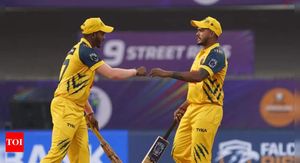New Delhi's assembly election outcomes delivered shocking results, with incumbent leader Arvind Kejriwal losing his seat to Bharatiya Janata Party (BJP) candidate Parvesh Verma. This marked not only the end of Kejriwal's hold on the powerful New Delhi constituency but also indicated a significant shift in Delhi's political dynamics.
For many, the New Delhi constituency has always been at the heart of heated political battles. Kejriwal, who secured the seat three times consecutively, was considered the favorite going by historical trends since he emerged as the ‘giant killer’ by defeating three-time Chief Minister Sheila Dikshit back in 2013. The tables, it seems, have turned dramatically this time around.
The elections were held on February 5, 2025, with the counting of votes commencing early the next day. Preliminary results showed the BJP surging, leading with 47 out of the 70 total assembly seats, with AAP managing only 22. Congress, represented by Sandeep Dikshit, the son of Sheila Dikshit, failed to make any significant electoral gains, unable to secure even one seat.
After conceding defeat, Sandeep Dikshit took full responsibility for Congress's lackluster performance. "For this humiliatory defeat, I am personally responsible. The voters of Delhi wanted change, and I failed to live up to their sentiment," he expressed on social media. His acknowledgment highlights the difficulties faced by Congress as it attempts to regain footing after suffering considerable losses in recent elections.
The BJP's triumph was hailed by its leaders, with Virendra Sachdeva, Delhi BJP President, attributing their victory to Prime Minister Narendra Modi's governance model. "The people of Delhi have chosen PM Narendra Modi’s good model of governance and have rejected Arvind Kejriwal’s bad," he asserted, framing the election as a referendum on local governance issues.
Virendra Sachdeva highlighted the grievances shared by voters, citing failures on issues such as contaminated water, broken roads, pollution, and sanitation as key factors behind the voters' shift away from AAP. The BJP structured its campaign around these concerns, branding Kejriwal's leadership as ineffective. "Their prominent leaders will lose the elections because they have betrayed the public. Arvind Kejriwal, Manish Sisodia, Atishi—these are all faces of corruption. The people will not forgive them," Sachdeva added emphatically.
Throughout the campaign, Sandeep Dikshit targeted Kejriwal, accusing him of merely rebranding and continuing projects initiated during Sheila Dikshit’s tenure. His sentiment was echoed by Latika Dikshit, Sheila Dikshit’s daughter, who noted, "During campaigning, we listened to the problems of the people..." highlighting allegations of Kejriwal's absence from the constituency over the past decade, which seemed to add fuel to the rivalry.
Kejriwal began counting day with moments of optimism, leading the vote count initially before falling behind Verma, who would rob him of the seat by 4,089 votes as the results finalized. Such was the nail-biting contest's intensity; early trends had the constituencies alternating between Kejriwal and Verma. Yet, the shift was definitive by the evening, cementing Verma's victory.
Parvesh Verma, the BJP candidate, expressed his gratitude to the voters, crediting PM Modi for the success. "This government which is going to be formed will bring PM Modi's vision to Delhi. I give credit for this victory to PM Modi. Thank you to the people of Delhi," Verma declared triumphantly.
The loss for AAP signifies more than just one constituency—it indicates broader struggles for the party, which had previously dominated the Delhi assembly by placing itself as the voice of change against the incumbent Congress. After sweeping the assembly elections of 2015 and 2020, where they won by wide margins, the current results point to growing dissatisfaction amid unresolved issues such as pollution and governance.
While AAP's economic and welfare policies endeared them to many, underlying problems have started weighing heavily on public opinion. The BJP, recognizing this vulnerability, executed its campaign against AAP with pointed accusations, drawing from the growing urban concerns of citizens. The voters' decisions have left the AAP grappling with nostalgic sentiments versus the present needs of their constituents.
Now, eyes turn to the future of Delhi's political scenario. With BJP's newfound strength, the likelihood of AAP reforming its strategies and policies becomes imperative. Both voters and party machinery will be watching closely to see how Kejriwal and his party respond to this setback. Amid speculation of forming alliances, especially after calls for Congress and AAP to cooperate post-election, the path forward remains murky. Sandeep Dikshit hinted at hope for rekindling Congress's relations with the electorate, though time will tell if strategy shifts will resonate.
The outcome of the 2025 Delhi Assembly Election reverberates not just as another political contest but marks the potential reshaping of governance narratives for the National Capital Region. With Kejriwal conceding his seat, he might find himself needing to reassess AAP's influence beyond personal victories, significantly altering Delhi's political calculus.



